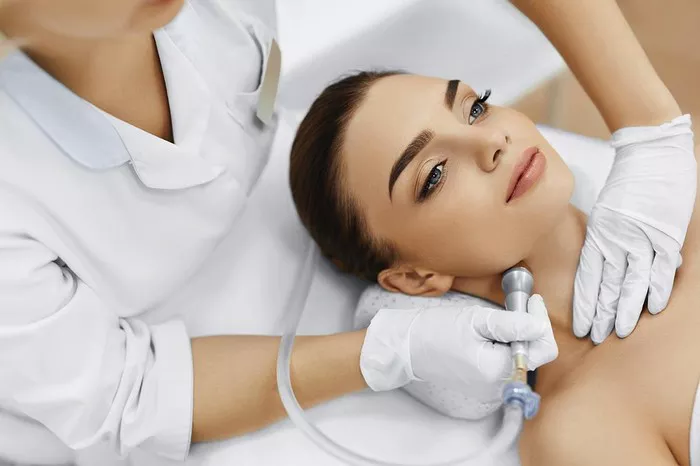As the years go by, many individuals seek ways to maintain youthful, radiant skin and minimize the visible signs of aging. The pursuit of effective anti-aging solutions has led to a myriad of products, treatments, and lifestyle changes aimed at preserving skin health and appearance. In this article, we delve into the world of anti-aging skincare, exploring the best strategies and practices to achieve and maintain youthful skin that radiates vitality and confidence.
Understanding the Aging Process
Before diving into anti-aging strategies, it’s important to understand the natural aging process of the skin. As we age, several factors contribute to changes in our skin’s appearance:
Collagen and Elastin Loss: Collagen and elastin, proteins responsible for skin’s firmness and elasticity, diminish over time, leading to sagging and wrinkles.
Hydration and Moisture: Skin’s ability to retain moisture decreases, resulting in dryness and a dull complexion.
Cell Turnover: The rate of cell turnover slows down, leading to a buildup of dead skin cells and a less vibrant appearance.
Environmental Factors: UV radiation, pollution, and other environmental stressors can accelerate the aging process and cause damage to the skin.
Effective Anti-Aging Strategies
Sun Protection:
Sun protection is paramount in preventing premature aging. Daily use of broad-spectrum sunscreen with at least SPF 30 can shield the skin from harmful UV rays and prevent photoaging.
Healthy Diet:
A balanced diet rich in antioxidants, vitamins, and minerals supports skin health from within. Foods like berries, leafy greens, nuts, and fatty fish provide nutrients that promote collagen production and combat oxidative stress.
Hydration:
Proper hydration is essential for maintaining skin’s elasticity and moisture balance. Drinking plenty of water and using hydrating skincare products can help keep the skin plump and radiant.
Skincare Routine:
A consistent skincare routine tailored to your skin type and concerns can make a significant difference. Key components include cleansers, moisturizers, serums, and treatments containing ingredients like retinol, hyaluronic acid, and peptides.
Retinoids:
Retinoids, derivatives of vitamin A, are known for their powerful anti-aging effects. They can stimulate collagen production, increase cell turnover, and improve skin texture and tone.
Topical Antioxidants:
Antioxidants such as vitamin C and E protect the skin from free radicals and UV damage, helping to prevent premature aging.
Hydroxy Acids:
Alpha hydroxy acids (AHAs) and beta hydroxy acids (BHAs) exfoliate the skin, promoting cell turnover and revealing a fresher, more youthful complexion.
Professional Treatments:
Medical-grade treatments like chemical peels, microdermabrasion, and laser therapies can address deeper skin concerns and promote collagen remodeling.
Consistent Hygiene:
Proper skincare hygiene, including gentle cleansing and avoiding harsh products, helps maintain skin’s natural balance and prevents irritation.
Sleep and Stress Management:
Quality sleep and stress reduction techniques contribute to overall skin health. Lack of sleep and chronic stress can accelerate the aging process and affect skin’s appearance.
Consultation with Professionals
For personalized anti-aging recommendations, consulting with a dermatologist or skincare professional is advisable. They can assess your skin’s unique needs, address specific concerns, and recommend appropriate products and treatments.
Choosing the Right Products
When selecting anti-aging products, it’s important to consider your skin type, sensitivity, and specific concerns. Patch-testing new products can help avoid adverse reactions.
Lifestyle Factors
Beyond skincare, certain lifestyle choices contribute to anti-aging efforts:
Regular Exercise:
Exercise improves blood circulation, promotes a healthy glow, and supports overall well-being.
Balanced Sleep:
Aim for 7-9 hours of quality sleep per night to allow skin cells to regenerate.
Smoking Cessation:
Smoking accelerates skin aging by restricting blood flow and depleting collagen levels.
Limit Alcohol Intake:
Excessive alcohol consumption can dehydrate the skin and contribute to premature aging.
Conclusion
In conclusion, achieving youthful, radiant skin involves a combination of effective strategies, consistent skincare routines, and healthy lifestyle choices. Protecting the skin from UV damage, adopting a balanced diet, using quality skincare products, and seeking professional guidance are all integral components of an anti-aging regimen. Embracing habits such as proper hydration, stress management, and adequate sleep contributes to a holistic approach to skin health. By investing in these practices, individuals can nurture their skin’s timeless radiance, exuding confidence and vitality that transcends the passage of time.


